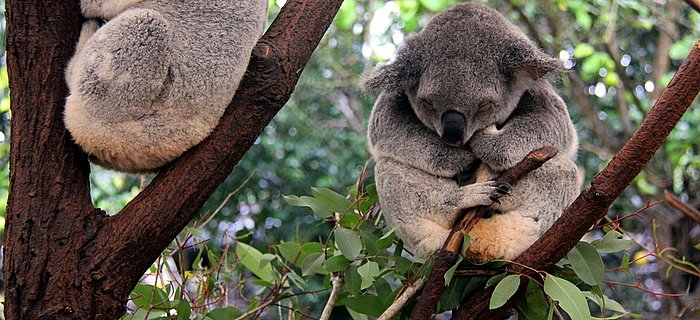Friday, September 9th: Brisbane, Australia
Our first stop on the Australian cruise is the port of Brisbane along the east coast of the country. Docking at the new Portside Wharf on the northeast fringes of the city meant that we would take advantage of public transportation today to see the city and to get to our stop for the day — Lone Pine Koala Sanctuary.
A short 10 minute walk down the riverfront (there is a large river that essentially cuts the city in half diagonally) brought us to Brett’s Wharf, a pickup point for the Brisbane public ferry system, CityCat. Running every 10-12 minutes, the ferry was quick, efficient, and took us from the northeast edge of the city to the southwest via the river and provided a scenic vantage point of the city as we made our way to the Regatta station. From here, we picked up a local bus and continued for another 20 minutes to the Lone Pine Koala Sanctuary.
Lone Pine began with only 2 koalas, but providing them a safe and humane environment has helped, over time, to boost its numbers to 130 koalas within the park. In addition, there are a large number of endemic Australian animals, many of which are within human reach. Although there are fences at the park, they make up huge enclosures that humans and enter and exit at their leisure, seeing flightless birds, kangaroos, and koalas with no barriers whatsoever.
We began our day in the kangaroo enclosure and saw more 3 different types of kangaroos, that varies their heights, sizes, and coloring. There were dozens within this several acre enclosure and it was exciting, not only getting close to the animals, but to see children feeding the kangaroos and to be able to be as interactive as possible. A number of rangers were available to answer questions about their diets and to ensure the safety and comfort of the animals — they come first here.
From here, we got to see wombats, a close cousin of the koala and though they bite, so they have to stay in a walled enclosure, we we’re still able to get quite close to the action. A number of introductions to the animals at the park were provided by the rangers, so we were able to get a lot of information about the different animals, their habitats, and diets.
In the same enclosure, there were also two very large flightless birds that had the size and stature of an ostrich or emu, but with brilliant black and green plumage, much like a peacock!
From here, we got our first sights of 4 koalas, but these guys were sleeping amongst the eucalyptus trees, so we let them be. Surviving on a diet solely of eucalyptus leaves, it is a very low energy diet, which accounts for the 18-20 hours of sleep a koala requires on a daily basis. Given that there are more than 100 in the park, we knew we had plenty of time to see others, and later that morning, we weren’t disappointed!
Next stop in the park was the Lorikeets, a beautifully colored bird that is closely related to parakeets and parrots, and as the park is big on interaction, we didn’t just see them flying amongst the trees, we got to feed them! The ranger introduced the birds, their diets, and how to best interact with them, and then provided us with large plastic feeding bowls with food on an extended handle. Then the birds began to flock — dozens of them, making a huge ruckus of noise, feathers, and low flying dives towards the morning meal. We both took turns with the feeding platform and several birds ate and flew around as the crowd oohed and aahed in delight.
From here, we worked our way towards the center of the park and to the main atttraction — the koala viewing areas. Here, there were several areas dividing the koalas into different groups (not only to help visitors better understand, but to also ensure that they are interacting with the public just a few minutes a day, and are constantly rotated to avoid over stimulation and to maintain their health and well-being.) They had viewing areas of males and females, grandparents (the retirement community), kindergarten (young koalas), the nursery (new parents with their joeys), and more. Touching koalas is strictly controlled, but being able to get within a foot or two of them all without fences was truly an amazing experience. Watching them interact in social groups, eat eucalyptus (they go through 2 grocery bags worth of leaves a day!), and care for their young was really eye-opening, and their personality seemed extremely relaxed and laid back.
From here, we got the opportunity to hold and take pictures with some of the animals at the sanctuary. Since it was our first interaction with the koalas, we both wanted to hold one, and Darin got a chance to hold a small crocodile (it’s mouth had to be taped as it can be prone to startle and snap with flash photography, but seemed quite content when it was held…)
The koala cuddling (as its called and rightly named) starts with one of the park rangers with the koala and directing park visitors to the correct positions and hold methods for the animals. Once the rules have been reviewed, you get to hold one for about 2 minutes per person, and you can take pictures, or just interact with the animals. The koala we had was incredibly gentle, mellow, and a lot of fun. We were able to ask a ton of questions to the ranger, and she was very informative and gracious.
After all of the pictures, we checked out several more enclosures (these did have fences or glass to avoid some rare birds and animals flying or getting away), but we were able to see a number of tropical birds, Australian dingos, Tasmanian Devils, and a golden possum. In addition, the reptile house provided us with a view of the 2 most venomous snakes in Australia (behind huge thick glass, which the best way to appreciate them) along with a number of frogs, non-poisonous snakes, and turtles.
It was amazing to consider how much we were able to see and do in such a short time at Lone Pine Sanctuary. The staff and crew truly consider the needs of the animals as a primary focus and we can only hope that more “zoos” of the world take note and develop methods to allow for a more natural and interactive method of learning about the speicies that we share the planet with.
At this point in the day, the sky opened up and the rain came, and came, and came some more. (Though this was a huge surprise to everyone as the weather forecast mentioned nothing more than mostly sunny skies and 72 degrees!) In just over an hour everything was drenched on in a storm that piles tropical storm winds and torrential downpours. Thankfully, we were in a well protected area and waited the storm out. Thankfully, we had the opportunity to see so much before the storm moved into full gear.
When it was time to head back to the ship, we headed out to the bus stop, where we met several staff members from the production and music teams onboard. Great folks that recently joined up with the ship and we got to know them on our ride back into the city center. A few of them, continued the journey with us back to the ship on the City Cat ferry, while some others headed into downtown Queen Street.
Back on board, passengers shared tales of the surprise downpour, and we slowly made our way back to the coast to continue north towards our next port, Airlie Beach and the Whitsunday Islands. More to come soon!



Leave a reply